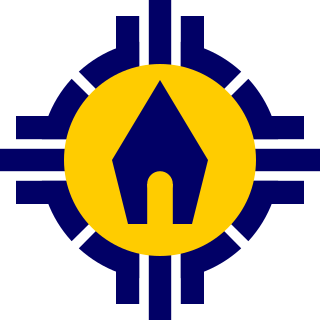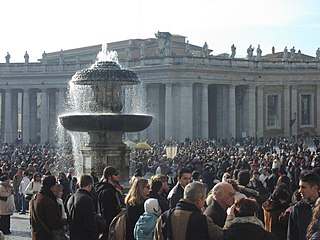
A synod is a council of a church, usually convened to decide an issue of doctrine, administration or application. The word synod comes from the Greek: σύνοδος [ˈsinoðos] meaning "assembly" or "meeting" and is analogous with the Latin word concilium meaning "council". Originally, synods were meetings of bishops, and the word is still used in that sense in Catholicism, Oriental Orthodoxy and Eastern Orthodoxy. In modern usage, the word often refers to the governing body of a particular church, whether its members are meeting or not. It is also sometimes used to refer to a church that is governed by a synod.
In religious organizations, the laity consists of all members who are not part of the clergy, usually including any non-ordained members of religious orders, e.g. a nun or lay brother.

The Apostolic Movement of Schoenstatt is a Roman Catholic Marian movement founded in Germany in 1914 by Father Joseph Kentenich, who saw the movement as a means of spiritual renewal for the Catholic Church. The movement is named Schoenstatt after a small village close to the town of Vallendar near Koblenz, in Germany.

The Couples for Christ (CFC) is an international Catholic lay ecclesial movement whose goal is to renew and strengthen Christian values. It is one of 123 International Associations of the Faithful. The organization is affiliated with the Vatican recognition from the Pontifical Council for the Laity. It is led by an International Council, which operates in the Philippines under the Catholic Bishops' Conference of the Philippines and acquired direct rapports with the Vatican City. The community consists of family ministries, social arms, and pro-life ministries.

The International Union of the Guides and Scouts of Europe - Federation of Scouts of Europe is a traditional faith-based Scouting organization with 20 member associations in 17 European countries and also in North America, serving roughly 65,000 members. The organization, headquartered in France, was founded in 1956 by a group of German and French Roman Catholic Scoutmasters as a faith-based Scouting movement, in order to reconcile the European peoples in the aftermath of the Second World War.
The lay apostolate is made up of laypersons, who are neither consecrated religious nor in Holy Orders, who exercise a ministry within the Catholic Church. Lay apostolate organizations operate under the general oversight of pastors and bishops, but need not be dependent upon them for direction.
The Christian Life Movement is a lay ecclesial movement, founded in 1985, in Peru. At that time, a number of initiatives from members of the Sodalitium Christianae Vitae had already begun. Luis Fernando Figari, the Founder of the Sodalitium, conceived the idea of gathering those people and initiatives together in an ecclesiastic movement. The Christian Life Movement forms part of the Sodalit Family, which shares a common spirituality, called the Sodalit spirituality.

Sodalitium Christianae Vitae (SCV), or Sodalitium of Christian Life is a Society of Apostolic Life of Pontifical Right, according to the Code of Canon Law which governs the Latin Rite branch of the Catholic Church. It was founded in Lima, Peru, by Luis Fernando Figari on 8 December 1971. It acquired its present canonical form when Pope John Paul II gave his Pontifical approval on 8 July 1997. The Sodalitium was the first male religious society in Peru to receive papal approval. By 1997 there were Sodalit communities in several countries.

The Pontifical Council for Justice and Peace was a dicastery of the Roman Curia dedicated to "action-oriented studies" for the international promotion of justice, peace, and human rights from the perspective of the Roman Catholic Church. To this end, it cooperates with various religious institutes and advocacy groups, as well as scholarly, ecumenical, and international organizations.

The International Alliance of Catholic Knights (IACK) is a non-governmental organization made up of fifteen Roman Catholic fraternal societies from 27 countries on six continents. The IACK was founded in Glasgow on 12 October 1979 at a meeting of the leaders of six fraternal societies, convened on the occasion of the Diamond Jubilee of the Knights of Saint Columba. The organization is headquartered in Dublin, Ireland.
The Directory of International Associations of the Faithful, published by the Dicastery for the Laity, Family and Life, lists the international associations of the faithful in the Catholic Church that have been granted official recognition. It gives the official name, acronym, date of establishment, history, identity, organization, membership, works, publications, and website of the communities and movements.
In the Catholic Church, an association of the Christian faithful or simply association of the faithful is a group of baptized persons, clerics or laity or both together, who, according to the 1983 Code of Canon Law, jointly foster a more perfect life or promote public worship or Christian teaching, or who devote themselves to other works of the apostolate.
A Catholic lay association, also referred to as Catholic Congress, is an association of lay Catholics aiming to discuss certain political or social issues from a Catholic perspective.

Stanisław Marian Ryłko is a Polish Cardinal of the Roman Catholic Church. He held positions in the Roman Curia beginning in 1987 and was president of the Pontifical Council for the Laity from 2003 to 2016. He was made a cardinal in 2007. He has been Archpriest of the Basilica of Santa Maria Maggiore since 28 December 2016.
The Pontifical Council for the Laity was a unit of the Roman Catholic Curia from 1967 to 2016. It had the responsibility of assisting the Pope in his dealings with the laity in lay ecclesial movements or individually, and their contributions to the Church. Its last Cardinal President from 4 October 2003 to 31 August 2016 was Cardinal Stanisław Ryłko. Its undersecretary from 1967 to 1976 was Professor Rosemary Goldie, the first woman to be the Undersecretary of a Pontifical Council and the highest-ranking woman in the Roman Curia at the time. Another layman, Professor Guzman Carriquiry Lecour, was undersecretary from 1991 to 2011.

Jesus Youth is an International Catholic Movement, approved by the Holy See. The Movement evolved as an outcome of the Charismatic revival that spread across India in the mid-1970s. As of 20 May 2016, it has been granted recognition by the Vatican as an international private association of the faithful with juridical personality. The movement invites its youth to follow a lifestyle considered to be based on the life of Jesus Christ, based on what it calls 'six pillars'.

Pontificalis Domus was a motu proprio document issued by Pope Paul VI on 28 March 1968, in the fifth year of his pontificate. It reorganized the Papal Household, which had been known until then as the Papal Court.
The Lay Centre at Foyer Unitas is a Catholic educational institution providing an international community and formation for lay ecclesial ministers and other lay students at the Pontifical Universities, Athenae, and Institutes in Rome, Italy. It is international in character and composition, and welcomes ecumenical students from other Christian churches and ecclesial communities, as well as those from non-Christian religions.

Catholic laity are the ordinary members of the Catholic Church who are neither clergy nor recipients of Holy Orders or vowed to life in a religious order or congregation. Their mission, according to the Second Vatican Council, is to "sanctify the world".
Teams of Our Lady is a Roman Catholic lay organization recognized by the Holy See under the Pontifical Council for the Laity. It is a movement of "Married Spirituality" which brings together Christian couples united by the Sacrament of Marriage; and who wish, together, to deepen the graces of the Sacrament of Marriage. The movement is active in 75 countries.











